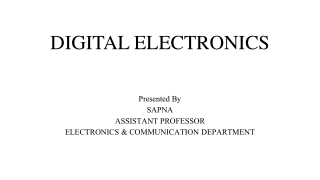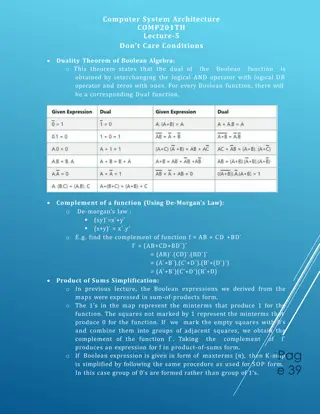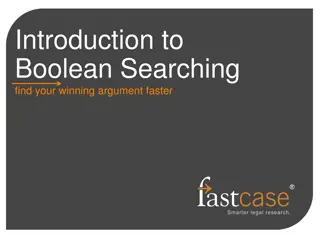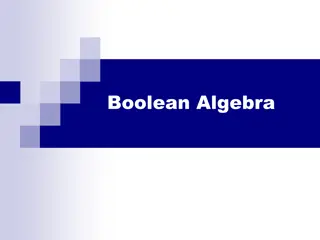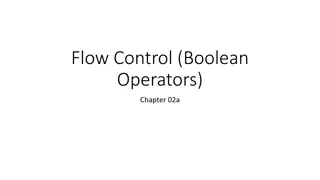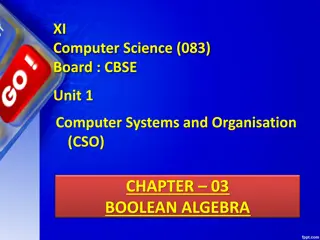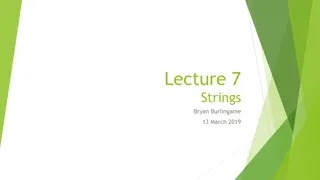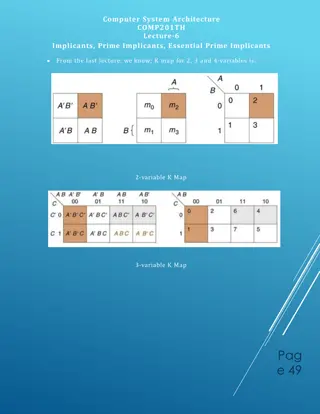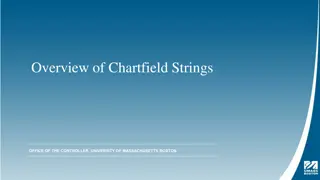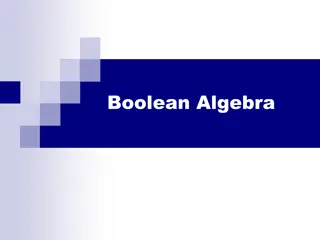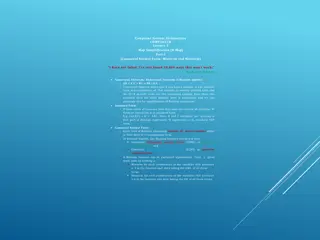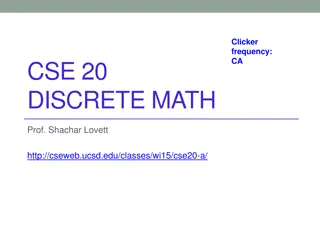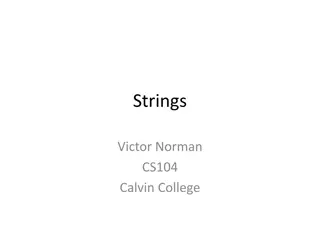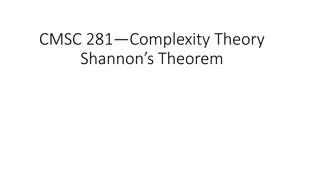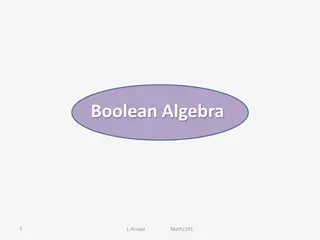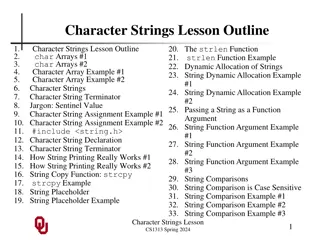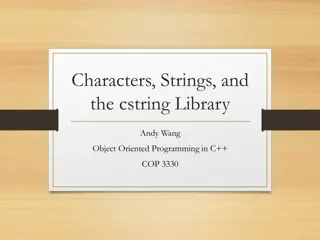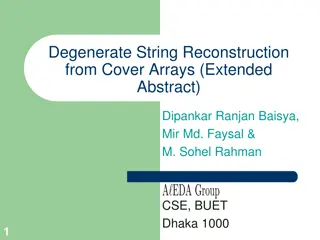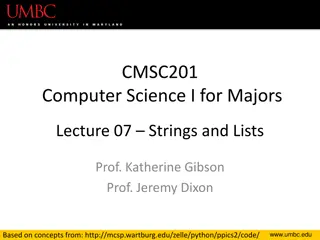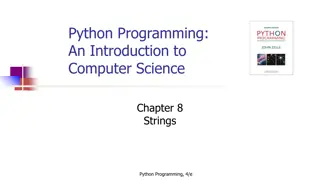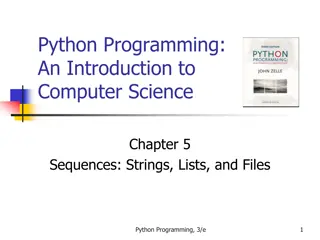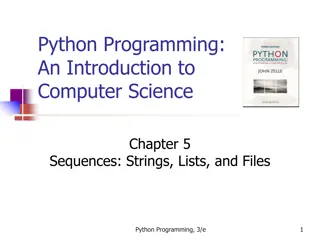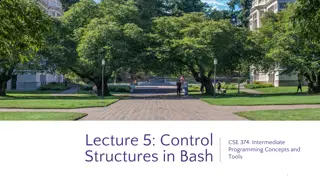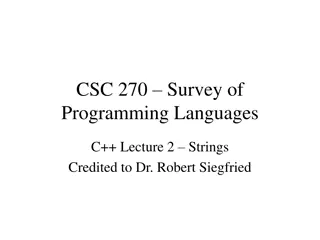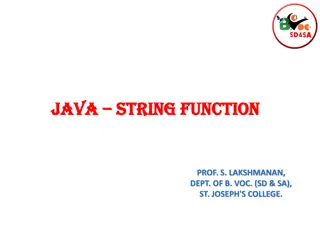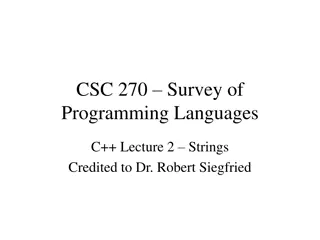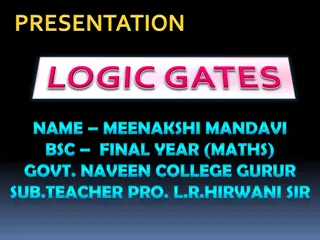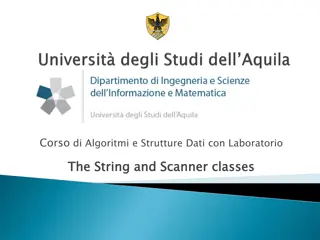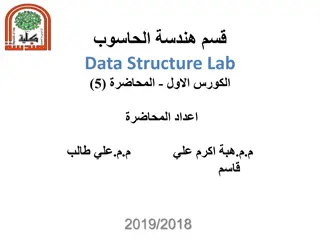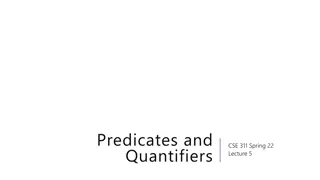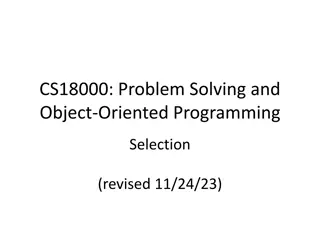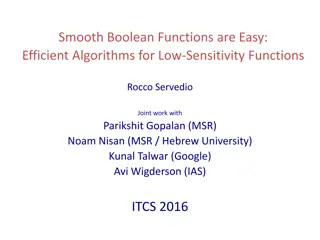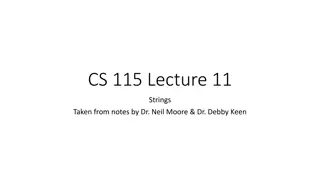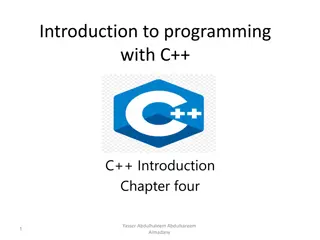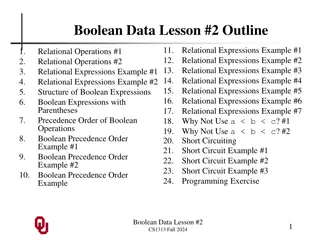DIGITAL ELECTRONICS
Introduction to digital electronics covering binary digits, logic levels, boolean algebra, logical operators (AND, OR, NOT), laws of boolean algebra, and operations like logical multiplication and addition. Learn about the fundamental concepts essential for understanding digital circuits and operati
0 views • 67 slides
Boolean Algebra: Duality Theorem, De-Morgan's Law, and Don't Care Conditions
Boolean algebra concepts such as the Duality Theorem, De-Morgan's Law, and Don't Care Conditions are essential for digital circuit design. The Duality Theorem states the relationship between a Boolean function and its dual function by interchanging AND with OR operators. De-Morgan's Law helps find t
0 views • 10 slides
Mastering Boolean Searching for Efficient Information Retrieval
Explore the power of Boolean searching techniques to streamline your research process. Learn the differences between indexed and full-text databases, grasp the nuances of Boolean operators, and uncover tips for refining your search queries effectively. Dive into the world of synonymy and ambiguity m
0 views • 34 slides
Boolean Algebra and Logical Statements
Introduction to Boolean algebra, logical statements, and compound statements. Explore the concepts of Boolean variables, logical operators, writing conventions, equivalence in Boolean algebra, and truth tables. Learn how to analyze and evaluate logical expressions using truth tables.
1 views • 25 slides
Boolean Operators and Control Flow in Programming
Explore the world of Boolean operators and control flow in programming with this detailed chapter. Learn about comparison operators, boolean values, and the logical operators and, or, and not. Understand how these concepts are used to control the flow of your code through practical examples. Dive in
1 views • 10 slides
Boolean Algebra in Computer Science
Boolean algebra, developed by mathematician George Boole, is essential in computer systems for performing logical operations with True and False values represented as 1 and 0. It involves operators like AND, OR, and NOT, enabling digital computers to process information effectively. Truth tables aid
0 views • 52 slides
Strings in Python Programming
Strings in Python are sequences of characters with various operations like initialization, accessing, traversal, slicing, and mutability. Learn about basic concepts, such as string initialization using quotes, accessing individual characters, determining string length, traversing strings, slicing su
1 views • 20 slides
Boolean Function Simplification using Prime Implicants and Essential Prime Implicants
Understanding the concepts of implicants, prime implicants, and essential prime implicants is crucial for simplifying Boolean functions using Karnaugh maps. Prime implicants are the largest possible groups of 1s, while essential prime implicants are those that must be included in the minimal sum-of-
0 views • 8 slides
Chartfield Strings in University Financial Management
Chartfield strings play a crucial role in organizing university financial data to track revenue and expenses effectively. They consist of various components like business unit, fund, department, program code, and more, each serving a specific identification purpose. By utilizing chartfield strings,
0 views • 10 slides
Boolean Algebra and Logical Statements
Boolean Algebra allows for formalizing logical reasoning using variables that can be either true or false. It involves logical statements, compound expressions, logical operators like AND, OR, NOT, writing conventions, equivalence, and truth tables to determine the truth values of statements. By und
0 views • 25 slides
Boolean Algebra: Canonical Normal Form, Minterms, and Maxterms Explained
Boolean algebra concepts including Canonical Normal Form, Minterms, and Maxterms are discussed in detail, along with examples and truth table representations. The Consensus Theorem and Redundant Theorem of Boolean Algebra are also explained, highlighting simplification techniques for Boolean express
0 views • 5 slides
Boolean Logic and Contrapositive Forms in Discrete Math
Delve into the world of Boolean logic and contrapositive forms in discrete math through topics such as simplifications, DeMorgan's Laws, and conditional operators. Explore how to identify equivalent Boolean expressions and prove contrapositive statements using logical reasoning.
0 views • 22 slides
Introduction to Strings in C++ Programming
In C++, strings are arrays of characters that can hold letters, numbers, symbols, and end with a null character '\0'. String manipulation involves operations such as assignment, concatenation, comparison, and input/output. The declaration, initialization, and basic operations on strings like joining
0 views • 24 slides
Bi-Decomposition of Large Boolean Functions Using Blocking Edge Graphs
Bi-decomposition is a vital technique in logic synthesis for restructuring Boolean networks. This paper discusses the methodology of breaking down large Boolean functions using Blocking Edge Graphs (BEG) to simplify physical design and reduce complexity. The process involves constructing BEG, perfor
1 views • 29 slides
Strings and Operations in Programming
This content delves into the concepts of strings, their manipulation methods, and various operations related to strings in programming. It covers collection data types, immutable nature of strings, string operations like concatenation and slicing, comparing strings, and practical examples of string
5 views • 29 slides
Circuit Size Bounds in Complexity Theory
The article delves into Shannon's Theorem in Complexity Theory, discussing the upper bounds of circuit sizes for Boolean functions of n variables. It explores the 1-1 correspondence with 0-1 strings of length 2n and how Boolean functions can be expressed as CNF or DNF formulas. The computation of th
2 views • 19 slides
Holland Brook School Winter Concert Featuring 5th Grade Strings & Chorus, 4th & 5th Grade, Band, February 27, 2017
The Holland Brook School Winter Concert is scheduled for February 27, 2017, at 7:00 PM. The event will feature performances by the 5th Grade Strings, 4th & 5th Grade Chorus, and 5th Grade Band. The 5th Grade Strings will be directed by Mr. Jack Hasselbring, presenting pieces like the New World Symph
0 views • 10 slides
Boolean Algebra: Operations and Functions
Delve into the world of Boolean Algebra, where we manipulate binary values to model logical operations like complementation, summation, and product. Learn how Boolean functions are defined and represented, along with practical examples and logical equivalences. Discover the essence of Boolean expres
0 views • 20 slides
Character Strings in C Programming
Dive into the world of character strings in C programming with topics like string declaration, termination, copying functions, comparisons, and dynamic allocation. Explore how to work with character arrays and pass strings as function arguments for effective programming. Enhance your knowledge throu
0 views • 33 slides
Characters, Strings, and Cstring Library in C++
This content delves into the usage of characters, strings, and the cstring library in C++. Covering topics such as C-style strings, character literals, array functions, conversion functions, query functions, string I/O operations, and more, it provides a comprehensive overview essential for masterin
0 views • 25 slides
Efficient Algorithms for Degenerate String Reconstruction from Cover Arrays
Presented in this extended abstract are efficient algorithms for reconstructing a degenerate string from a valid cover array. The paper discusses the extensive use of degenerate strings in molecular biology for modeling biological sequences and expressing polymorphism. It introduces two algorithms�
0 views • 59 slides
Lists and Strings in Computer Science I
In this lecture, we delve into the concepts of lists and strings in computer science, exploring their importance, representation, and built-in functionality. We discuss the utility of lists to store and manage data efficiently, compared to using individual variables for each data point. By understan
0 views • 44 slides
Introduction to Python Strings and Basic Operations
Python Programming introduces the string data type, representing text in programs as a sequence of characters enclosed in quotation marks. This chapter covers operations on strings using built-in functions and methods, sequences and indexing in Python strings and lists, string formatting, cryptograp
1 views • 67 slides
Introduction to Python Programming: Strings, Lists, and Files
This chapter delves into the fundamental concepts of Python programming related to sequences, specifically focusing on strings, lists, and file processing. It covers the representation of strings, various operations that can be performed on them, basic ideas of sequences and indexing for strings and
2 views • 109 slides
Python Programming: Strings, Lists, and Files in Computer Science
This chapter delves into the fundamentals of Python programming, focusing on sequences like strings, lists, and files. You will discover how strings are represented, explore operations on them, including built-in functions and methods. The text covers the basics of sequences, indexing, string format
0 views • 109 slides
Strings in Programming
Strings are essential in programming for representing various data types, languages, and programs. They offer unique features like slicing, ranges, and comprehensions. This article explores string literals, different forms of strings, similarity to lists, differences between lists and strings, and s
0 views • 34 slides
Working with Strings in Python
Python strings can hold any number of characters and can be created using single or double quotes. There is no difference between using single or double quotes in Python strings. Strings can be concatenated using the '+' operator, and repetitions of a string can be achieved using the '*' operator. U
0 views • 21 slides
Bash Control Structures Overview: Functions, Variables, Boolean Logic, and If Statements
This lecture covers essential topics in Bash scripting, including control structures such as functions, variable scope, boolean logic, and if statements. Understand how to declare functions, manage variable scope, use boolean operators for logic operations, and create conditional if statements for d
0 views • 11 slides
Overview of C++ Strings and Predefined Functions
This content provides an in-depth look at C++ strings, comparing standard string handling to C-style strings. It covers topics such as declaring and initializing strings, predefined functions in
0 views • 15 slides
Java String and StringBuffer: Immutable vs Mutable
Strings in Java are immutable sequence of characters, while StringBuffer provides mutable string objects. Learn about creating, manipulating, and comparing strings in Java programming. Explore the differences between immutable strings and mutable string buffers, and how to concatenate strings effect
0 views • 35 slides
Introduction to C++ Programming: Strings and Predefined Functions
This lecture covers essential concepts and functions related to strings in C++, including predefined functions in
0 views • 49 slides
Introduction to Logic Gates: Understanding Boolean Algebra and Applications
Meenakshi Mandavi, a final year BSc Mathematics student, discusses Logic Gates, Boolean Algebra, discovery of Boolean Algebra by George Boole, types of Logic Gates such as OR, AND, NOT, NAND, NOR, their universal properties, and uses in calculators and computers.
0 views • 8 slides
String Handling in Java
String handling in Java involves creating, manipulating, and comparing strings using various methods provided by the String class. Strings are immutable objects in Java, meaning their values cannot be changed once created. Methods like examining individual characters, comparing strings, searching, a
3 views • 41 slides
Constants and Literals in C++ Programming
Constants and literals in C++ are fixed values that the program cannot alter. They come in various types such as integer numerals, floating-point numerals, characters, strings, and boolean values. Integer literals can be decimal, octal, or hexadecimal constants, while floating-point literals have in
0 views • 7 slides
Boolean Algebra: Predicates and Quantifiers in CSE 311 Spring '22 Lecture 5
Dive into the world of Boolean Algebra with this comprehensive guide that explores the fundamentals of predicates, quantifiers, and their applications in computer science and circuit design. Discover the concepts behind Boolean variables, logical operations, and equivalence in Propositional Logic. E
0 views • 52 slides
Problem Solving and Object-Oriented Programming Selection
This content covers topics such as the if statement, booleans, relations, selection statements, sequential execution, control structures, decision making, primitive type boolean review, and comparing strings in the context of problem-solving and object-oriented programming. It explains concepts like
0 views • 56 slides
Complexity Measures of Boolean Functions
This work delves into the intricate world of complexity measures for Boolean functions, exploring concepts such as certificate complexity, decision tree depth, sensitivity, block sensitivity, PRAM complexity, and more. It sheds light on the relationships among different complexity measures and provi
0 views • 36 slides
Working with Strings in Python: Functions and Operations Explained
Explore the usage of strings in Python, from basic operations like reading input and printing to advanced functions like finding string length, extracting characters, and more. Learn how to manipulate strings effectively by converting them, concatenating, comparing, and checking for digits. Dive int
0 views • 22 slides
Introduction to Programming with C++: Strings and Concatenation
This overview delves into the fundamentals of working with strings in C++, covering string declaration, concatenation using the + operator, creating spaces in output, and utilizing the append() function. The importance of including the
0 views • 17 slides
Relational Operations for Boolean Expressions
Learn about relational operations in Boolean expressions through examples and explanations. Discover how to compare numeric operands to produce Boolean results, covering equal to, not equal to, less than, less than or equal to, greater than, and greater than or equal to operations. The content inclu
0 views • 25 slides
